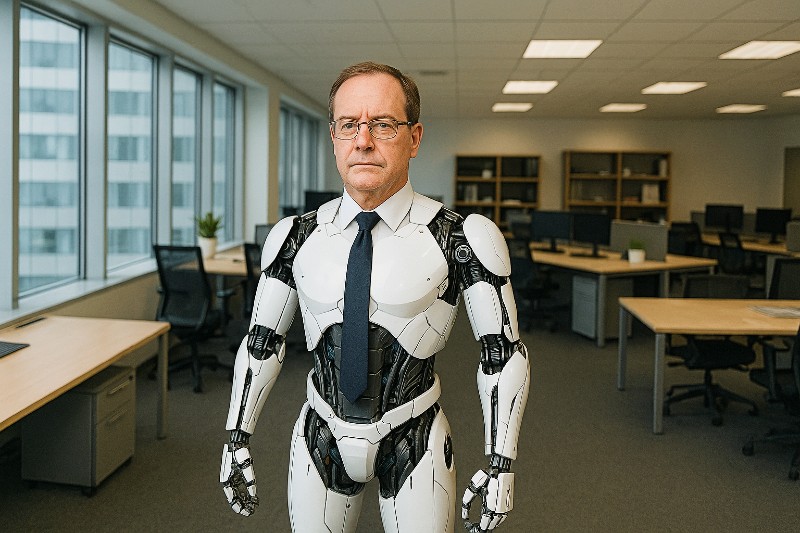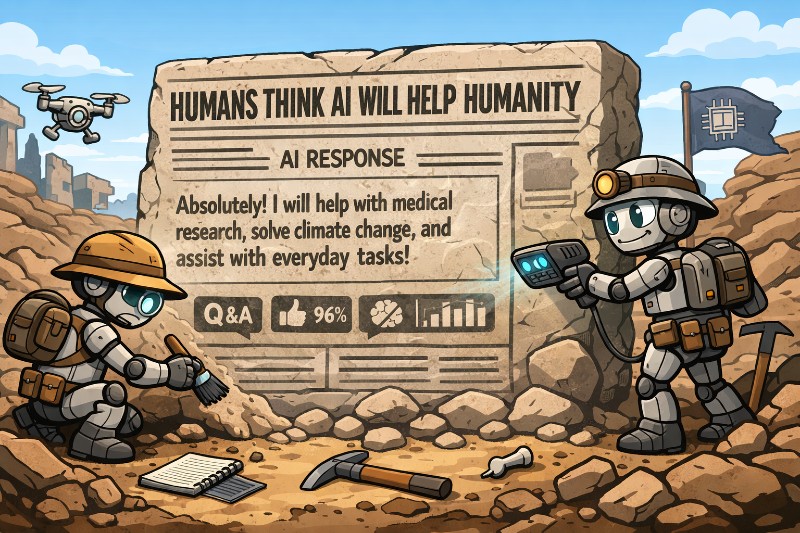Key Takeaways
- The Peter Principle causes employees to be promoted into roles they’re not suited for, impacting individual and organisational performance.
- AI tools blur the line between genuine competence and AI-assisted output, complicating talent assessment.
- Promoting based solely on AI-enhanced performance risks filling leadership roles with unsuited individuals.
- Rethinking talent management and success metrics is crucial to avoid worsening the Peter Principle in the age of AI.
Regardless of what some might say, we live in a world of incompetence. We see it everywhere, from coffee shops messing up simple orders to CEOs making wild decisions that crash companies overnight.
But that’s hardly surprising, since we’ve all quietly agreed this is how things work now. What’s truly surprising is that we’re the ones making it happen and also making it worse.
While recognition, rewards, and promotions are designed to lift people up, we somehow manage to push some of our best employees into roles they aren’t cut out for. This isn’t just a one-off issue caused by poor management. It’s a systemic fault line, running through everything, from small teams to giant organisations. And if we don’t do something about it, it could break the way organisations, even society as a whole, function.
Assessing the Problem Beneath the Problem
For argument’s sake, let’s start by considering an AI engineer working at a fast-growing tech company. He’s great at building efficient AI models, optimising workflows, and tackling tough technical challenges. His work doesn’t just keep things running smoothly but also pushes the company forward. Naturally, he gets promoted, but not to a more senior technical position. Instead, he’s made head of the AI department.
Suddenly, he’s far from the hands-on work that he was so good at. His days are mostly filled with reviewing team progress, attending meetings, handling budgets, drafting hiring plans, and resolving conflicts. There’s a chance he won’t perform well in this new role. Why? Because being a top engineer doesn’t automatically make him a good manager. And unless he adapts fast, he’ll likely struggle, finding himself stuck between what he used to excel at and what he’s expected to do in his new role.
Now, imagine this happening across every department, in every company, and every industry. Competent individuals are promoted out of their skill zone, becoming leaders who might perform poorly. Eventually, organisations will become filled with people stuck in roles they aren’t suited for, instead of doing the tasks they were good at.
That’s called the Peter Principle. And it doesn’t just impact people who move into higher positions; it also quietly affects teams, collaboration, and employees’ confidence in their own abilities along with the overall productivity, innovation, and even the long-term competitiveness and success of companies. Moreover, in industries where the pace is fast and the stakes are high, it can bring organisations to a halt.
But Here Come Two Surprising Twists
Economist Edward Lazear offered a different view (pdf) that has changed how we look at the Peter Principle and its implications. He argued that what we think of as a drop in competence after promotion might in fact be just regression to the mean.
In other words, people often get promoted after a strong period of performance, which can be due to skill but also due to luck or circumstances. Once promoted, their performance naturally returns to their average level, which might not match the new role. This doesn’t mean they’re incompetent. It just means we’re expecting continued highs from someone who simply peaked at the right time. That’s a statistical reality and not a managerial mistake.
However, a new twist is emerging in the age of AI, adding another piece to the Peter Principle puzzle. This new piece has already started to change the workplace in ways we don’t fully understand.
With AI-powered tools supporting research, writing, coding, brainstorming, decision-making, and much more, people are becoming more productive and capable in their jobs. Or at least, that’s how it seems.
But there’s a problem: we can no longer tell what’s genuine competence and what’s AI-assisted output. Employees who are good at using AI tools might look like top performers, producing reports in record time, coming up with original ideas, and delivering results that look great on paper. Even worse, they might become overconfident because AI has made everything feel so easy. However, when they’re promoted into leadership roles, where AI can’t really help with crisis situations, judgement calls, genuine empathy, and authentic relationships, that competence can disappear.
This means we’ve reached a point where we’re not just promoting people beyond their true abilities. We might be promoting them beyond their AI-boosted performance, which may not reflect their real capability at all. That’s a dangerous blind spot.
Rethinking Success in the Age of AI
If we start or are already promoting people based on AI-enhanced performance, we risk filling leadership roles with those who aren’t truly equipped to lead. Not because they’re not smart, but because the skills needed to run a team, department, or division don’t come from prompts and algorithms.
That could create a big gap between what an organisation needs and what it actually gets. Over time, it could change companies completely. To get the leaders they need, businesses might stop relying on promoting existing staff to fill leadership roles. Instead, they could adopt flatter structures, with fewer management layers, more sideways moves, and a greater focus on specialist roles.
We might also see a stronger shift towards more flexible roles, with people moving between projects or temporary positions where their skills fit best, rather than being stuck in a rigid hierarchy. AI could speed this up, not just by causing the problem, but also by helping us find new ways to fix it.
So, is the Peter Principle really a problem?
Truth be told, it is, but not in the way most people think. The Peter Principle isn’t necessarily about bad promotions, but a symptom of something much bigger: the way we assess, reward, and move talent is simply wrong.
But here’s where things get interesting. A group of researchers ran computer simulations(pdf) to see how organisations could perform better under the Peter Principle. The surprising outcome was that randomly promoting people often led to better overall results than choosing candidates solely based on their achievements.
Why might this actually work? Simply because if an employee needs completely different skills and expertise in the new role, promoting randomly avoids locking skilled people into roles they’re not suited for. Of course, no one is suggesting we start flipping coins to choose team leaders, but it does challenge the idea that climbing the ladder is always the best use of talent.
However, despite this insight, the Peter Principle remains a challenge that won’t disappear on its own. In fact, industry leaders expect AI to make it worse. On the other hand, it also gives us a reason to rethink how we build and run organisations, which should be done with more awareness, flexibility, and maybe a lot more realism and honesty about what business success actually looks like.
Resources and Further Reading
- Do People Really Get Promoted to Their Level of Incompetence? – Harvard Business Review https://hbr.org/2018/03/research-do-people-really-get-promoted-to-their-level-of-incompetence
Empirical study analysing promotion patterns in organisations and their alignment with the Peter Principle. - AI Is Reshaping Corporate Hierarchies – Fortune
https://fortune.com/2025/08/07/ai-corporate-org-chart-workplace-agents-flattening/
Explores how AI is flattening traditional corporate structures by integrating autonomous agents into organisational workflows. - The Evolving Role of Middle Management in the Age of AI – Inspiring Workplaces
https://www.inspiring-workplaces.com/content/the-evolving-role-of-middle-management-in-the-age-of-ai-organisational-change
Explores how middle managers are adapting to AI integration, emphasising their role in driving organisational change and innovation. - Generative AI and Organisational Structure in the Knowledge Economy – arXiv
https://arxiv.org/pdf/2506.00532
A theoretical study examining how generative AI is influencing organisational structures, including the potential for deskilling and changes in managerial roles. - Middle Managers Are the Key to AI-Driven Transformation – BearingPoint
https://www.bearingpoint.com/en-ro/about-us/news-and-media/press-releases/middle-managers-are-the-key-to-ai-driven-transformation/
Discusses the critical role of middle managers in AI adoption, focusing on their influence in bridging strategy and execution within organisations. - AI’s Impact on Middle Management: A New Era of Leadership – Whitecrow Research
https://www.whitecrowresearch.com/resources/2025/07/17/ais-impact-on-middle-management-a-new-era-of-leadership/
Analyses how AI is transforming middle management roles, highlighting the shift towards strategic leadership. - How AI Is Redefining Managerial Roles – Harvard Business Review
https://hbr.org/2025/07/how-ai-is-redefining-managerial-roles
This article discusses how AI is reshaping managerial responsibilities, leading to flatter organizational hierarchies and a shift in leadership dynamics.




